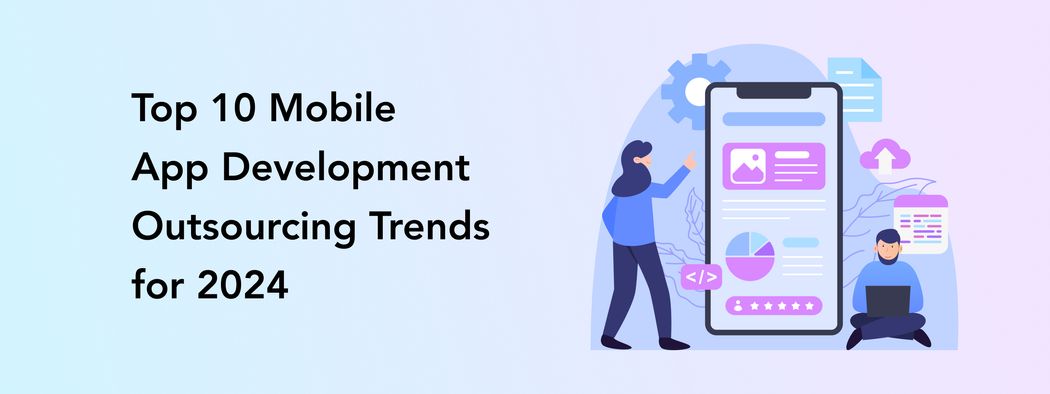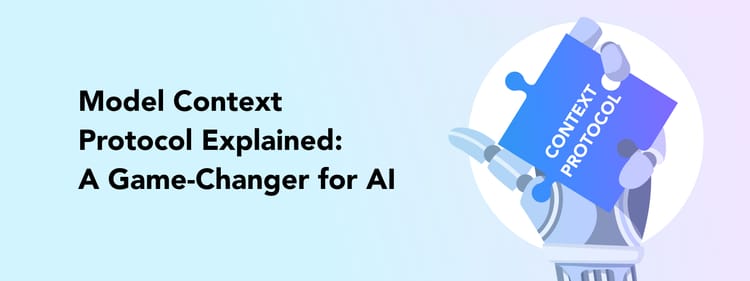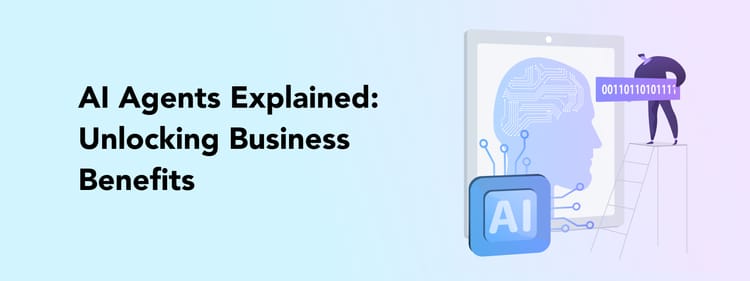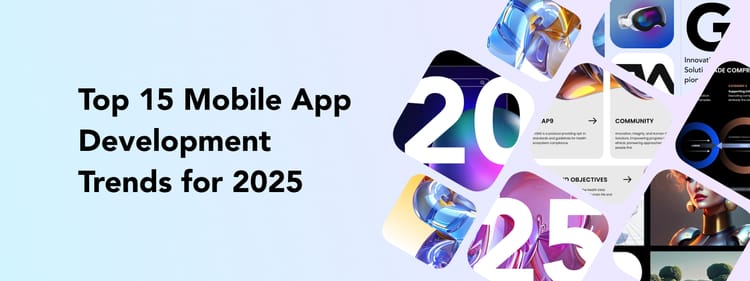The mobile app outsourcing market saw a great surge in the past few years. The global IT outsourcing market is expected to reach $1,149.24 billion by 2032 with a compound annual growth rate (CAGR) of 8.2%. Reasonable costs, access to a diverse talent pool, a rise of remote work convenience, and a chance to find experts with rare domain-specific and technical skills are all reasons companies outsource IT and mobile app development in particular.
Like the IT industry itself, mobile app outsourcing constantly evolves and offers new approaches to collaboration between clients and providers.
Let’s discover the main trends driving mobile app outsourcing services today and how to get the most out of your collaboration with a mobile app development company.
Business Analysis and Product Development Outsourcing
If, in the past, mobile app outsourcing was usually limited to UI/UX design and code writing, today, clients tend to expect more than that. Many startups are looking for their technological partners not only to take care of the development tasks but also to help identify the new product’s competitive advantage and overall take care of the business analysis side of work.
Speaking from our experience at Perpetio, more and more clients are contacting us with a startup idea or a product modernization request and want more than technical support. As they often do not have in-house business analysts or product managers, assistance with drafting out an effective feature set and business strategy is much needed.
Full-cycle Holistic Mobile App Development Approach
Another trend that IT outsourcing companies are embracing is offering a full cycle of application development, from market research to launch assistance. Clients now understand that isolated efforts might not have a good outcome compared to an aligned strategic step-by-step development.
Imagine this situation: you want to develop a mobile app. You get business analysis from your in-house specialist, UI/UX from a freelancer online, and app development services from an outsourcing company. Then, you try to receive the necessary certifications and launch the app yourself.
In this scenario, communication gaps and misunderstandings are often unavoidable. Vendors would pass documentation from one to another, a designer and developer cannot discuss the app design implementation aspects, and a QA specialist cannot directly address their concerns to the development team. Plus, you become a middle-man trying to establish a proper communication flow.
Instead, many mobile app development clients now want to receive a full cycle of development services from one vendor. When all aspects of a project are handled by a single vendor like Perpetio, from initial ideation to post-launch support and maintenance, several key advantages emerge:
- Streamlined communication: A single-vendor approach eliminates communication gaps that often arise when different teams or vendors are involved. It ensures everyone is on the same page and can clarify any issues, leading to clearer project goals and objectives
- Cross-team collaboration: With all project phases managed by one vendor, various teams (such as business analysts, designers, developers, and quality assurance) can seamlessly collaborate. It fosters a holistic view of the project, enabling better decision-making and problem-solving
- Efficiency and consistency: Tasks flow more smoothly from one phase to the next when managed by a single vendor. It results in efficient project timelines and consistent quality throughout development
At Perpetio, we leverage a holistic approach to mobile app and web development. When working with a new client, we try not only to do the technical tasks but also to suggest the best project decisions. Our specialists give free business and tech advice to ensure we create a product that will succeed and satisfy users, not just write a code and not ignore its purpose and intended functionality.
Artificial Intelligence Integration
Let’s face it: thanks to ChatGPT, artificial intelligence is the main technological trend these days, and it will likely remain at the top for some years. In a recent McKinsey survey, 40% of respondents stated that they plan to invest more in AI overall because of generative AI.
No wonder more and more companies are interested in integrating AI into their digital product. Mobile app development services providers now have AI experts on their teams as the demand for this technology is rising.
By incorporating AI-driven features such as predictive analytics, natural language processing, and machine learning algorithms, companies can provide personalized, data-driven solutions that cater to individual user needs. From better AI-aided chatbot customer assistance to new gaming experiences, artificial intelligence brings delight to users of a variety of apps, so outsourcing vendors are increasing their AI development offerings.
Outsourcing from Eastern Europe and Ukraine
When it comes to outsourcing software development, Eastern European countries, like Ukraine and Poland, have solidified their reputation as top destinations. Beyond the traditional cost-efficiency associated with outsourcing, several distinctive benefits make this region stand out.
- Technical proficiency: Ukraine boasts a highly educated and skilled IT workforce. Engineers, developers, and designers in this region are renowned for their technical prowess and ability to tackle complex projects precisely
- Cultural compatibility: Ukrainian teams often align closely with Western European and North American work cultures, making collaboration smooth and effective. Time zone proximity also facilitates real-time interaction and problem-solving
- Diverse skill sets: The talent pool in Eastern Europe is incredibly diverse, allowing businesses to find specialists in various domains, from AI and machine learning to blockchain and cybersecurity. This diversity enables companies to assemble teams with the expertise they need
- Innovation hub: The Eastern European tech scene is bubbling with innovation. Start-ups and tech hubs are flourishing, fostering an environment of creativity and continuous learning
As a Ukrainian team ourselves, we can prove that all these facts are true – with numerous conferences, startup hubs, and an ever-growing technological landscape, there is no way for a development team to stay behind. Plus, a healthy dose of competition with over 950 IT outsourcing teams motivates companies to provide a high level of expertise and innovation.
With the challenges of the ongoing war, Ukrainian outsourcing companies learned to adapt to changing environments and stay productive no matter what. For example, at Perpetio, no project was delayed or incomplete as our workspace setup and team location allow us to stay flexible and deliver high-quality products.
Cross-platform App Development
In the realm of app development, cross-platform development has emerged as a game-changer. This approach allows developers to create applications that run seamlessly across multiple platforms, such as iOS and Android, using a single codebase. While it may seem like a technical marvel, the real magic of cross-platform development lies in its ability to deliver cost-effective solutions without compromising quality.
Cost-effectiveness is indeed the main reason why cross-platform mobile app development is trending. Businesses can significantly reduce development time and costs by writing code once and deploying it across various platforms. This streamlined process allows startups and smaller companies to enter the app market without breaking the bank.
But what about quality? It's a valid concern for many businesses considering cross-platform development. The good news is that the quality of cross-platform apps is on par with their native counterparts. Unless you develop a highly complex, enterprise-level app or need advanced device-based features, the average user is unlikely to notice any significant difference between cross-platform and native apps.
Cloud-based Solutions
Why go cloud, you might ask? Cloud integration is not a new concept, but its significance in mobile app development has never been more pronounced. Here's why it matters:
- Enhanced storage and accessibility: Cloud integration allows apps to leverage cloud storage, freeing up valuable device space. This not only benefits users but also enables developers to create feature-rich apps without worrying about storage limitations
- Wider reach: With cloud integration, users can access their app data and preferences from any device with an internet connection. This seamless experience enhances user engagement and retention
- Real-time collaboration: Cloud-based apps facilitate real-time collaboration, making them ideal for team-oriented and productivity apps. Multiple users can work on shared documents, projects, or data simultaneously
- Cost efficiency: Major cloud providers work on a pay-as-you-go system, so you are paying only for the cloud capabilities you are actually using
- Real-time analytics: Users can access data from various sources and devices, opening up possibilities for timely updates, IoT integration, and more
- Enhanced security: While cloud integration raises security concerns, it also offers robust security features. Cloud services come with robust security features, including data encryption, authentication, and regular updates from the main cloud providers, like Google or Amazon Web Services, ensuring that sensitive information remains protected
Cloud migration has become a top business digitalization request for many IT outsourcing companies. 47% of organizations in a recent TechTarget’s Enterprise Strategy Group survey said they already follow a cloud-first strategy.
MVP Development Approach
In the ever-evolving landscape of technology and entrepreneurship, Minimum Viable Product (MVP) development has gained prominence as a strategic trend. At its core, MVP represents a streamlined and pragmatic approach to product development, particularly well-suited for startups looking to navigate the competitive market landscape.
The essence of MVP lies in its simplicity: rather than building an exhaustive app with a myriad of features, startups begin with the minimum set of features required to test their concept in the real world. This approach allows them to get their foot in the door swiftly, validate their idea, and gather invaluable user feedback.
At Perpetio, we always encourage startups and small businesses to develop an MVP first and then scale up as their user base and revenue grow. As a result, the companies receive an attractive, competitive product that boasts all the best features while, at the same time, not going over the top with extensive feature sets and complex designs.
Business Digitalization and App Modernization
In this day and age, many companies already have software solutions, be it a website, a customer management system, or an app. At the same time, the technological world is constantly advancing, and what was a top-notch solution two years ago is rapidly becoming outdated.
Plus, consider all the new technologies, such as AI or cloud computing, making their way to everyday use. It is not surprising that companies of all sizes now need to update their mobile applications.
The main motivations for businesses to modernize their products today are
- Adapting to the digital age: We are firmly in the digital age, where every aspect of business, from operations to customer engagement, is influenced by technology. The COVID-19 pandemic accelerated this shift, highlighting the importance of digital channels, remote work, and online customer experiences. Companies are racing to adapt and stay relevant in this new landscape.
- Enhancing customer experiences: Consumers expect seamless, personalized, and digitally-driven brand interactions. Businesses recognize that meeting these expectations is critical for growth and customer retention.
- Staying competitive: Companies that fail to embrace digitalization risk falling behind. As more organizations embrace digital strategies, the pressure to modernize products, services, and operations intensifies. It's a race to capture market share and maintain a competitive edge.
As businesses navigate this digital transformation, they increasingly turn to outsourcing providers with expertise in business digitalization and product modernization. These partners offer the technical prowess, experience, and strategic insights needed to navigate the ever-changing technological landscape.
App Maintenance Services
Mobile app development doesn't stop when a product is launched. In fact, that's just the beginning of a new phase. After the launch, companies need to do several things to keep their software running smoothly: collect feedback from users, analyze data, fix any issues that pop up, and plan for growth.
To do all of this effectively, businesses need a reliable tech partner, ideally the same company that developed the software in the first place. Why? Because they know the application inside and out, making them best equipped to handle maintenance.
Thus, we can observe how more and more companies opt for continuous collaboration with their chosen mobile app outsourcing company. Plus, with many clients getting MVPs, there is a need to analyze the product’s performance and eventually grow the functionality.
Niche Expertise
With the incredible diversity of IT outsourcing providers for any budget, clients are now looking for vendors with domain knowledge in specific technologies and industries rather than generalists needing more time to learn the industry’s peculiarities. This shift offers many advantages, ensuring businesses can find the perfect match for their needs.
Whether it's mobile app development, cloud solutions, AI, AR, or other tech domains, there will be a partner with the right skill set. Niche expertise extends beyond technology. Clients choose to work with providers specializing in certain industries, such as healthcare, e-commerce, or on-demand services.
Industry-specific insight is priceless, especially when dealing with intricate regulations and standards. Partners who understand these nuances empower businesses to navigate complex industries confidently, ensuring functional solutions and full compliance.
Naturally, mobile app outsourcing clients seek providers with a portfolio of projects in their chosen niche. Success stories in projects in the client’s domain are a great trustworthiness indicator and a main decision point.
Consider Perpetio Your Trusted Partner
In this ever-changing environment, having the right partner is crucial. With more and more IT outsourcing companies offering their services, clients’ requests are rising as they embrace a quest to find a perfect combination of cost, tech skills, communication style, and domain expertise.
These demands create new trends in mobile application outsourcing services and their quality. At Perpetio, we haven't just been observing these trends—we've been actively incorporating them into our approach. Our commitment to niche expertise ensures that we bring specialized skills and deep industry knowledge to every project. Plus, we tailor our services to each client’s unique needs and challenges.
We care more than just writing lines of code.
Your future in tech starts here, with Perpetio. Contact us today to get a free quote for your project.





